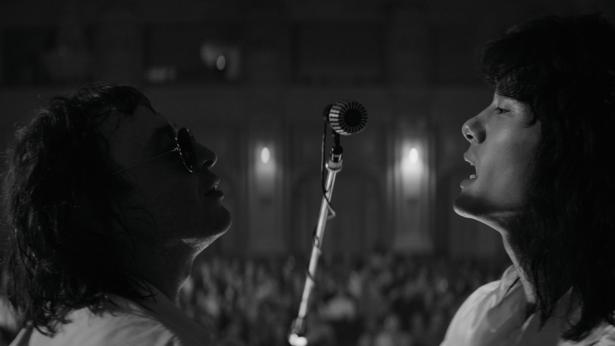film As Rocketman Rockets Into Theaters, Leto Offers A More Modest Rock-Musical Biopic
Elton John isn’t the only rock star getting the biopic treatment this weekend. Friday also brings a movie on another musical icon, albeit one largely unfamiliar to the American masses: Viktor Tsoi, frontman of perhaps the most popular and influential of Soviet rock bands, Kino. Tsoi and his bandmates and his peers operated in the long shadow of their Western heroes, smuggling the music they loved—and its defiant spirit—past the Iron Curtain. So it makes a certain kind of sense that Leto, a dramatization of the singer-songwriter’s pre-fame youth, begins its theatrical rollout the same day as Rocketman. Shot in pristine black-and-white instead of a bright spectrum of colors, the former is like a ramshackle, unglamorous, accidental answer to the latter—which is to say, it has a similar relationship to a rise-to-fame spectacle like Rocketman as Tsoi had to the rock royalty he worshipped.
Leto is actually something of a dual biopic. Set in the Leningrad of the early 1980s, when Moscow pop dominated Russia’s musical mainstream (and earned the endorsement of the party), it looks at Tsoi’s early years partially through the eyes of a contemporary: Mike Naumenko, lead singer of the similarly seminal Soviet outfit Zoopark. In fact, it’s the 26-year-old Naumenko (Roman Bilyk) who we first meet, channeling his influences during a piss-and-vinegar performance at a local club. Maybe the central figure of the country and city’s burgeoning rock scene, he takes under his wing the 19-year-old Tsoi (Teo Yoo), a beatnik whose more introspective sound defies easy classification. (“We’re not punk, we’re not rock, so what are we?” asks one of the musician’s future Kino collaborators.)
Both men would end up dying young—Tsoi in a car crash in 1990, Naumenko of a cerebral hemorrhage the following year. Letoviews the two as key players in a quiet, pre-perestroika cultural revolution. It also creates a personal stake for their clash of sensibilities, as Naumenko’s wife, Natasha (Irina Starshenbaum, a dead ringer for Mary Elizabeth Winstead), finds herself drawn to Tsoi’s earnest sensitivity. Does this love triangle complicate their mentor-protégé relationship? As Leto presents him, Naumenko is too committed to his bohemian ethos to ever show that the infatuation bothers him. But there may be some undigested feelings worked out in the moment when he joins Tsoi on stage, hijacking his big debut performance with some backup noodling—an unsolicited guest appearance that seems equally altruistic and competitive, brightening the spotlight on the new star even as the old one hogs it.
Directed by Kirill Serebrennikov (The Student), Leto takes some liberties with its behind-the-music material, to the point where some have denounced it as pure fiction. Certainly, the film’s depiction of Naumenko as the artist behind the superstar, passing the torch to someone destined for bigger things, downplays his own rather significant stature in Soviet rock history. (“Bob Dylan from Leningrad,” they sometimes called him.) Not that Leto doesn’t acknowledge its factual unreliability; a bespectacled supporting player occasionally breaks the fourth wall to note that “This did not happen”—a biopic technique that’s growing pretty stale. The same character also pops up during the film’s rather precious, reality-bending musical numbers, in which bystanders break out into phonetic sing-alongs of classic-rock touchstones like “The Passenger” and “Perfect Day,” Serebrennikov scribbling and scrawling words all over his B&W imagery, giving it the look of a moving punk zine. Along with a montage of famous album covers, these sequences make Leto come across less like a rock musical than a Rolling Stone listicle brought to life.
Then again, nods to music-industry giants are in keeping with the nature of the movement the film chronicles, a rock renaissance of imitation and emulation. These artists absorbed the forbidden sounds of The Sex Pistols and The Velvet Underground, then blasted them back out on stage; Naumenko was known to sometimes literally translate the lyrics of his big influences and even swipe their melodies, performing a kind of cultural public service by “remaking” songs for an audience with no direct access to them. What Leto understands is that the lives of these Russian rock pioneers never approached the excess and flashbulb excitement their American and British counterparts enjoyed. Steadicamming through modest concert venues and studio spaces, the film replaces the melodrama of the typical rock biopic with lots of downtime, spent recording and talking about music. Even the characters seem to know, and accept, that success on the level of, say, Elton John will elude them. As Naumenko puts it, “It’s okay in the swamp, especially if you’re No. 1 toad.”


Spread the word